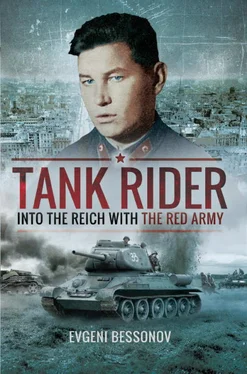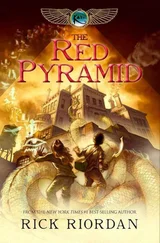ON TO BERLIN

On 24 February, 1945, rifle units replaced us, while our Brigade headed towards the town of Ober (Oberau) for replacements. The officers that took over our defence sector, said to us, after they heard we were from the 4th Tank Army: ‘Aha, so you are the bandits of Lelyushenko’s Army!’ We did not get the joke. They had to explain to us. There had been a special broadcast to the German people on the German radio: ‘Germans, save yourselves, bandits are coming – the tank crews of General Lelyushenko.’ One can conclude that our 4th Tank Army, including our Brigade, had played an important role in destruction of the German troops, if we scared the Nazi top brass so much. We stayed in Ober until 11 or 12 April, 1945, when the Berlin operation, the last operation of the War, commenced. We were so exhausted that for the first two or three days we just slept and did not wake up. After breakfast we would sleep till lunch, and then sleep again till evening. In the evenings we would play cards or write letters home, and then sleep again till morning. It is interesting that the entire company stayed in one house. The soldiers took two rooms, while platoon leaders Guschenkov, Mikheev, Petr Shakulo, who had returned from the hospital, the company’s Sergeant Major Bratchenko and I stayed in the third room on the second floor. I had a separate bed, above which I hung a German submachine-gun; Vyunov and Shakulo also had beds, while Mikheev and Guschenkov had to share a large sofa. All of us, including the soldiers, had feather beds and pillows.
Many officers and men were awarded with orders and medals for the Vistula–Oder Operation, including me – I got the Order of the Patriotic War 2nd degree. That was my third order in the war. They promised to recommend me for the Hero of the Soviet Union for battles in Poland and destruction of the German column – Major A. D. Stolyarov personally told me about that. However, as I later learned from Brigade’s clerk Chulkin (he had been my soldier since 1943), the recommendation was later replaced with recommendation for the Order of the Red Banner. The staff of my 6th Guards Mechanized Corps in turn, returned the recommendation paper with instruction to recommend me for the Order of Great Patriotic War 2nd degree. Well, God is their judge. I personally tried to recommend as many soldiers of my platoon as possible for decoration, and most of my recommendations worked, especially given the fact that Brigade Commander was authorized to award medals and the Order of the Red Star.
After an Order of the People’s Commissar of Defence of the USSR of 17 March, 1945, our Tank Army became part of the Guards – it was renamed the 4th Guards Tank Army. Our 49th Mechanized Brigade was renamed into 35th Guards Kamenets-Podolsk Mechanized Brigade, and we started to get higher wages (my wage, for instance, from that time on was 1,200 roubles, out of them 600 roubles as Lieutenant’s wage, 300 roubles for service at the front, and 300 roubles for being part of Guards). Money was not the main thing, though. It is prestigious to be a part of the Guards. We were all young at that time and we all had human needs. We wanted to do many things – have a nice dinner, sometimes have a drink, have a talk and recall things that we had experienced in peacetime and during the war, pay our honour to the dead and wounded.
The battalion commander and zampolit came to us one sunny day and told us that it was time to stop sleeping and start doing business – train the soldiers. We also had to be on alert, as there were groups of stray Germans roaming the area, who tried to go to the west, having come out of different encirclements. Alex Belyakov took prisoner several stray Fritzes, and some Germans were killed when trying to resist. We started to go to a nearby field for tactical training, but we did that as a pure formality, mostly resting – the replacements had not arrived yet. The real training was still ahead, after the replacements arrived – that was when we had to train the newcomers to fight the war. So far, there were very few of us – the battalion was almost completely wiped out. It was already March and it was nice warm weather in Germany; soon afterwards we received summer uniforms, throwing away the old winter uniforms, which we had worn for over four months, since November 1944. Despite that, we would change underwear more often, mostly we had German silk underwear, as there was plenty of it in abandoned German houses. Nevertheless, on pictures taken at Prague upon my return from the hospital (May 1945) I am dressed in winter woollen trousers and a gimnastyorka tunic. Apparently, I had not changed into summer uniform – I could afford it, but the battalion’s commander tolerated this, knowing my love of warm clothes. Just like many others, in Ober I ordered leather jackboots and a woollen garrison cap for myself, although during the summer we would all normally wear field caps.
Soldiers and sergeants, who had already fought the war in the battalion, started to come back to the battalion from hospitals, and finally we were fully manned. Many soldiers were Russians who had been taken from the USSR into Germany and had worked in Germany on farms or in German industries. We had to train them a lot – we had to teach them how to fight the war. In my platoon I only had soldiers who had fought in the platoons of the company before being wounded. I was glad to see them, they knew me, and I also knew them from previous battles.
My orderly Drozd with his companion showed initiative and brought a cheese (it was of size of a car wheel), chicken and other poultry, spirits, flour, butter, sugar and even two cows. We had around 40 chickens, not to mention the other things. We organized cooking by the soldiers of the company who knew how to cook, and soon most of the soldiers of our depleted company stopped going to the battalion’s kitchen. One would come back from the training for lunch, have a bit of alcohol, a snack and then eat borscht or chicken soup, fried potatoes and roast meat of chicken, followed by tea or stewed fruits and pirogi or doughnuts. We were already sick and tired of the battalion’s kitchen with its schi (cabbage soup) or pork fat soup. In the mornings soldiers had milk with fresh white bread and cheese and something else. I was even scolded by the battalion’s commanders, because my soldiers were not eating anything from the battalion’s kitchen – for some reason they called me, not the company commander or the company’s Sergeant Major, and told me to stop the ‘mess’ and feed soldiers only from the kitchen. After that they told me that though my platoon had experienced soldiers that had seen the war, many of them were to go to other platoons and companies as squad leaders in order to bolster the green soldiers. Then they asked me: ‘Do you know why the soldiers want to be in your platoon?’ I answered, that they would probably want to be under command of battalion’s and company’s veteran. They answered: ‘No, not because of that. The soldiers say that no one gets killed in your platoon!’ After that they showed me statistics, that my platoon did not lose anyone in the previous two or three months, just had wounded that returned to the platoon later. I had not paid attention to the fact that my platoon only had old hands. The soldiers had noticed that and asked to transfer to my platoon. Actually, travelling from the Vistula to the Neisse as a vanguard of the Brigade and not having a single soldier killed was a miracle. I was unable to save my soldiers and myself from enemy fire, I just could not do it, but we escaped without fatalities. It just means that we were all extremely lucky, that’s it. Others were less lucky in the operation. On 19 March the commander of our 6th Guards Lvov Mechanized Corps, Colonel V. F. Orlov, was killed. Colonel N. D. Shuprov, commander of the 10th Guards Tank Corps, was also killed in March; the commanders of the 16th Guards Mechanized Brigade, Colonels L. D. Churilov and Ryvis, were heavily wounded. No one is insured against death at the front.
Читать дальше














